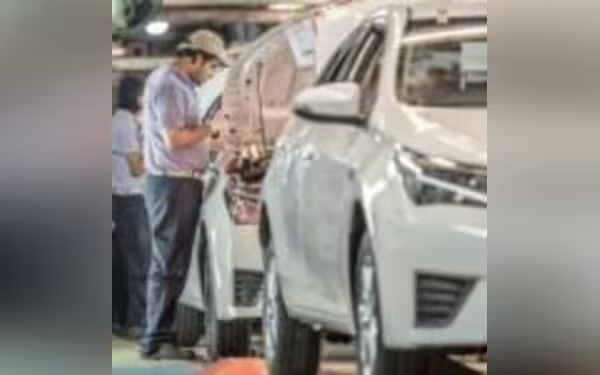Sunday, December 22, 2024 07:39 PM
Local Auto Manufacturers Alarmed by NEV Policy's CBU Import Provisions
- Local OEMs fear market share erosion from CBU imports.
- PAMA urges government to reconsider NEV policy implications.
- Proposed amendments aim to protect local auto industry.
 Image Credits: pakistantoday
Image Credits: pakistantodayLocal auto manufacturers express concerns over NEV policy allowing unrestricted CBU imports, risking market share and industry growth.
In recent developments, local auto manufacturers in Pakistan have expressed serious concerns regarding the proposed new energy vehicle (NEV) policy. This policy, if implemented as currently outlined, could potentially allow for unrestricted imports of completely built units (CBUs) at significantly lower duty and sales tax rates. Such a move is feared to jeopardize the local original equipment manufacturers (OEMs), disrupt the supply chain for parts, and ultimately hinder the growth of Pakistan’s auto industry.
The Pakistan Automotive Manufacturers Association (PAMA) has been vocal about its apprehensions regarding the NEV policy and its related documents. The government has suggested subsidies of Rs50,000 for electric two-wheelers and Rs200,000 for electric three-wheelers, which may seem beneficial at first glance. However, the implications of reduced duties (25%) and sales tax (10%) on CBU imports could lead to a significant erosion of market share for local OEMs. This situation could adversely affect parts manufacturers and discourage future investments in the sector.
PAMA Director General Abdul Waheed Khan has raised these issues in a letter addressed to the Engineering Development Board (EDB). He emphasized that the NEV policy could undermine the objectives of the Automotive Industry Development and Export Policy (AIDEP) 2021-26, which aims to maintain balanced tariffs across various vehicle types, including internal combustion engine (ICE) vehicles, hybrid electric vehicles (HEVs), plug-in hybrid electric vehicles (PHEVs), and electric vehicles (EVs).
In light of these concerns, PAMA has proposed amendments to the AIDEP 2021-26 to promote NEVs while ensuring consistency and maintaining investor confidence. They have urged the government to reconsider the potential impact of the NEV policy. Currently, used car imports already account for 30% of the market annually, and further erosion due to unrestricted CBU imports could devastate the local auto sector.
PAMA has recommended that CBU imports be restricted solely to electric and fuel-cell vehicles, while also suggesting the elimination of used car imports, except for overseas Pakistanis purchasing locally produced vehicles. Furthermore, they proposed that importers or investors should be mandated to invest in localization efforts to prevent short-term profiteering.
To ensure a fair playing field, PAMA suggested aligning NEV incentives with other vehicles after the third year, allowing only new models to qualify for benefits. They also believe that PHEVs and HEVs should remain under the AIDEP 2021-26 policy until 2030, with equal incentives for both categories. Additionally, renewable energy vehicles, such as biogas fuel vehicles, should be included in the NEV definition.
To safeguard the local industry, PAMA insists that CBUs should only be permitted for companies that meet local manufacturing standards, as outlined in SRO 656. This measure is crucial to prevent the risk of vehicles being imported without adequate technical or aftersales support.
While the NEV policy aims to promote electric vehicles and reduce environmental impact, it is essential to strike a balance that protects local manufacturers and ensures sustainable growth in Pakistan’s auto industry. The concerns raised by PAMA highlight the need for careful consideration and strategic planning to foster a thriving automotive sector that benefits all stakeholders involved.













